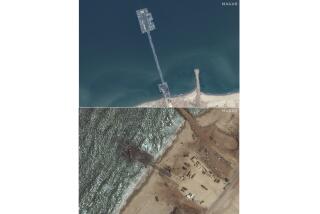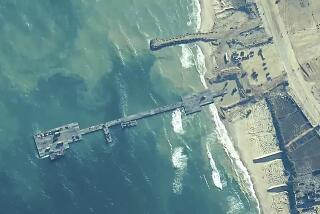Food Arrives as Kuwaitis Start Cleanup
- Share via
KUWAIT CITY — Emergency truck convoys are supplying food, water and medicine to this war-weary capital, but relief officials said restoring electricity will take 10 days or more.
Retreating Iraqi troops damaged fuel cells at three of four plants that generate electricity and cut long sections from power lines across the country, a senior U.S. Army official told reporters Tuesday.
“Transmission of power--that’s the showstopper,” said the official, who heads a 2,700-member U.S., Kuwaiti, French, British and Saudi emergency operation called Task Force Freedom.
He said technicians hope to restore partial power from the Razur power plant by March 15, but weeks may pass before full power is returned to the city.
The official, who cannot be identified under briefing rules, said trucks were delivering food to 38 local cooperatives. Water was also going to farmers who moved livestock herds into the nearly deserted city during Iraq’s seven-month occupation.
Only one-third of Kuwait city’s residents are believed to have stayed during the occupation. A few shops opened Tuesday, but streets were mostly empty.
The official said the U.S. Navy tested water at local reservoirs and that gravity-fed pipes will be opened in three days, providing potable water to part of the city.
At least two water pumping stations were destroyed, and the extent of damage is still unknown at the country’s desalination plant.
The emergency operations have been hampered by a continuing search for mines, booby-traps and unexploded ordnance.
No booby-traps have been found, but two children were reported injured by an Iraqi mine, the official said. Other children were found playing in an abandoned Iraqi tank that was filled with ammunition and had a loaded shell in its gun breech.
French soldiers have cleared munitions from at least five embassies and are combing pillboxes, trenches and sand on the beach for mines. The search for hundreds of underwater mines was eased after an Iraqi diagram identified their location, the official said.
“I think the Navy has about 50 guys out there having a great time taking the mines out,” he said.
He said the Kuwaitis burned garbage during the occupation, so sanitation did not appear a problem. A Saudi company has won a contract to begin picking up the city’s trash Sunday, he said.
One out of seven telephone substations has been repaired after extensive vandalism.
About 217 tractor-trailer trucks have delivered 385,000 tons of rice, lentils, oil, milk, tea and other food to the city, and five trucks have delivered drugs and medical supplies to city hospitals, he said.
“The hospitals can provide basic medical care and surgery,” he said.
The Iraqis emptied schools of desks, blackboards and books. They destroyed science laboratories and the library at Kuwait University.
Officials said 280 contracts have gone out so far to companies around the world in what some estimate to be a national reconstruction effort costing $50 billion to $100 billion. More than 100,000 overseas workers are expected to flood into Kuwait to fill construction, welding, maintenance and other jobs.
The Kuwaiti military controls the city under martial law. However, gunfire fills the air each afternoon as hundreds of people celebrate by firing assault rifles, pistols and machine guns in a parade of honking horns down the city’s winding corniche.
Many wave U.S. flags, and someone has scratched out a highway sign pointing to Baghdad Street. It now says--with feeling, if incorrectly--”Busch Street.”
More to Read
Sign up for Essential California
The most important California stories and recommendations in your inbox every morning.
You may occasionally receive promotional content from the Los Angeles Times.














